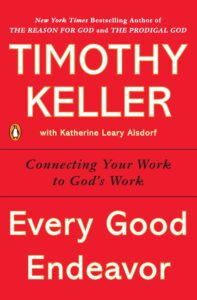Editor's note: This is the second in a three-part blog series exploring "Every Good Endeavor" by Tim Keller and Katherine Leary Alsdorf. The Denver Institute for Faith & Work Book Club will explore books, share ideas, and encourage each other as we integrate our faith and work. Share your thoughts in our private Linkedin Group.

In this section, Alsdorf and Keller explore some of the main ways that work has been twisted and disfigured as we labor and toil in a world deeply wounded by sin and futility. As the Bible sees it, the fall into decay and corruption impacted not only individuals, but the systems and structures of our world, which is why we often experience disappointment, failure, or even deep pain in our work. Although there are many ways that this brokenness can invade our work, Alsdorf and Keller outline several corruptions of work that crop up again and again.
For one, sometimes our work appears fruitless, like we just can’t accomplish what we’re meant to with our lives; sometimes our work simply doesn’t materialize the way we hoped it would, as Alsdorf and Keller illustrate with reference to the frustrated artist Niggle in J.R.R. Tolkien’s novella Leaf by Niggle. Other times, work feels pointless; we become alienated from our work and lose sight of its purpose, staring at our computers or waiting tables or driving trucks without any idea whether what we’re doing actually makes any difference. Or maybe you know what it’s like when your work grows selfish, consuming you and others through an unholy appetite for achievement and recognition. Finally, we experience the fallenness of work through idolatry: we make a god out of our accomplishments and are slowly (and usually, unwittingly) conformed into the distorted image of what we worship. Before we recognize it, we’ve confused our job with our identity and we are using our work to serve ourselves instead of God and neighbor.
It’s a grim picture, but we’ve got to face it. As you read this section, take the time to reflect on the ways you’ve experienced futility in your work: take an inventory of the frustration, incompleteness, and disappointment that characterize your work in this fallen world. But just as importantly, pay close attention to the ways that the hope offered by the gospel can confront and ultimately overcome the fruitlessness, pointlessness, selfishness, and idolatrousness that plague our work this side of paradise.
Reflection
1. “You should expect to be regularly frustrated in your work,” write Alsdorf and Keller, “even though you may be in exactly the right vocation.” How have you experienced frustration and futility in your daily work? Be specific. How does the gospel offer consolation in the face of disappointment and fruitlessness in our work?
2. Drawing on the Bible’s most melancholy book, Ecclesiastes, Alsdorf and Keller show that, even if we are “successful” by conventional metrics, we may still feel that our work is meaningless because it cannot fulfill our deepest longings or desires. Why do you think a sense of pointlessness in work is so common in our culture? What resources does a biblical vision of the place and purpose of work offer in the struggle against alienation in our work?
3. Alsdorf and Keller suspect that one of the reasons we are prone to selfishness in our work is that we are, consciously or not, trying to prove our worth and secure our identities. But the gospel tells us that we do not find our value—or our salvation—in our “life’s work.” Why is it so common to find our identities in our occupations? How would it change your approach to your work to recognize that your identity is secure in Christ?
4. The journalist Derek Thompson has recently argued that, for many Americans, work has taken on the character of a religion—“workism,” as he terms it. This should come as no surprise, according to Alsdorf and Keller, since work has a tendency to reveal our idols. In what ways does our culture’s understanding of work end up looking like a religion? What are the idols of the American workplace? Now take a moment for some introspection. What does your work life say about what you love most? How can the gospel free you from false gods in your professional life?
Keep the conversation going! Join us in our private Linkedin Group to share your thoughts.

